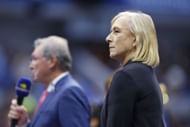Martina Navratilova recently reflected on a challenging and very unfair phase of her tennis career soon after she came out as a lesbian. She broke shackles back in the early 1980s when she publicly revealed her sexual orientation but was subjected to poor treatment from a large section of the tennis world.
Navratilova was already a bonafide superstar at the time but public sentiment quickly went against her and the Czech-American tennis great believes it was largely down to the fact that she came out as gay. Speaking during a recent interview with Julie Bindel, Navratilova said that while she did not come across naysayers in one-on-one interactions, she was well aware of the larger sentiment.
The 66-year-old remembers seeing fans shower love on the likes of Chris Evert and Evonne Goolagong, but she was always subjected to jeers and muted applause, mostly because she is gay.
"I didn't really see it face-to-face, it was kind of the bigger picture when I was introduced to come on the court. Everybody was cheering when Chris Evert was introduced or Evonne Goolagong, but when I came out onto the court it was muted applause," Navratilova said on the matter, in a video posted on Julie Bindel's YouTube page.
"There were some jeers, some whistles. It was hard not to take it personally but I realized it was mostly because I was gay. Some of it was because I was winning too much perhaps," the 18-time Grand Slam singles champion added.
On the point of "winning too much," Navratilova further highlighted that people never had a problem with other players winning and dominating, referencing the likes of Roger Federer and Rafael Nadal. She feels that even when Federer had more fans on his side when facing Nadal, the fans still cheered for Nadal. Navratilova lamented that she never got that support after coming out as gay.
"But Roger Federer never got that kind of welcome, right? Nobody jeers when Roger Federer walks onto the court. Even Rafa Nadal. Even if people are not big fans or they're in the Federer corner, they still cheer when Rafa walks onto the court. But that was not the case with me," Martina Navratilova added.
"I was just trying to win over the audience by who I was, I thought it was enough" - Martina Navratilova

Martina Navratilova further spoke about the poor reaction to her revelation back in the day, stating that she believed she could win over the audience by simply being herself, which should have been enough. While she eventually found support, it came after a long period of struggle.
"I was just trying to win over the audience by who I was. I thought it was enough. At the end, they were on my side, but it took a while," she said.
However, Navratilova, the winner of an Open Era record 59 Grand Slams across singles and doubles, had bigger battles to face back then. While the public reaction was difficult to take, she did not care much as it was more difficult for her to deal with being away from her family for over four years after moving to the United States from Czechoslovakia.
"Coming from Czechoslovakia and leaving my country, this stuff was not going to bother me. What bothered me was not seeing my family for 4 years. That was the tough part. This? Some nobody I don't know call whatever they want to call me? Who cares?" Martina Navratilova further stated.
